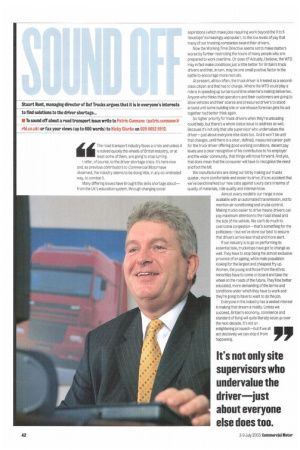Stuart Hunt, managing director of Dar Trucks argues that it
Page 42

If you've noticed an error in this article please click here to report it so we can fix it.
is In everyone's interests to find solutions to the driver shortage...
• To sound off about a road transport issue write to Patric Cunnane (patric.cunnane( rbi.co.uk) or fax your views (up to 60) worth) to Hicky Clarke on 020 8652 8912.
The
solved glickly the wheels of British industry, or at
g he road transport industry faces a crisis and unless it
least some of them, are going to stop turning.
I refer, of course, to the driver shortage crisis. It's here now and, as previous contributors to Commercial Motorhave observed, the industry seems to be doing little, in any co-ordinated way, to combat it.
Many differing issues have brought this skits shortage about— from the UK's education system, through changing social aspirations (which make jobs requiring work beyond the 9 to 5 'envelope' increasingly unpopular), to the low levels of pay that many of our trucking companies award their drivers.
Now the Working Time Directive seems set to make matters worse by further restricting the hours of many people who are prepared to work overtime. Or does itP Actually, I believe, the WTD may in fact make conditions just a little better for Britain's truck drivers and that, in turn, may be one small positive factor in the battle to encourage more recruits.
At present, all too often, the truck driver is treated as a secondclass citizen and that has to change. Where the WTD could play a role is in speeding up turnaround time when he's making deliveries. Anyone who thinks that operators and their customers are going to allow vehicles and their scarce and pressured drivers to stand around until some building site or warehouse foreman gets his act together had better think again.
So higher priority for truck drivers when they're unloading could help, but there's a whole status issue to address as well. Because it's not only that site supervisor who undervalues the driver—just about everyone else does too. And it won't be until that changes, until there is a clear, defined, measured Career path for the truck driver offering good working conditions, decent pay levels and a clear recognition of his contribution to his employer and the wider community, that things will move forward. And yes, that does mean that the consumer will have to recognise the need and foot the bill.
We manufacturers are doing our !DEE by making our trucks quieter, more comfortable and easier to drive. It's no accident that we've benchmarked our new cabs against luxury cars in terms of quality of materials, ride quality and internal noise.
Almost every model in our range is now available with an automated transmission, not to mention air conditioning and cruise control. Making trucks easier to drive means drivers can pay maximum attention to the road ahead and the size of the vehicle. We can't do much to overcome congestion—that's something for the politicians—but we've done our best to ensure that drivers arrive less tired and more alert.
If our industry is to go on performing its essential task, truckstops have got to change as well. They have to stop being the almost exclusive province of an ageing, white male population looking for the largest and cheapest fry-up. Women, the young and those from the ethnic minorities have to come on board and take the wheel on the roads of the future. They'll be better educated, more demanding of the terms and conditions under which they have to work and they're going to have to want to do the job.
Everyone in the industry has a vested interest in making that dream a reality. Unless we succeed, Britain's economy, commerce and standard of living will quite literally seize up over the next decade. It's not an if we all
enlightening prospect—but decisively we can stop it from PP happening.




































































































































































